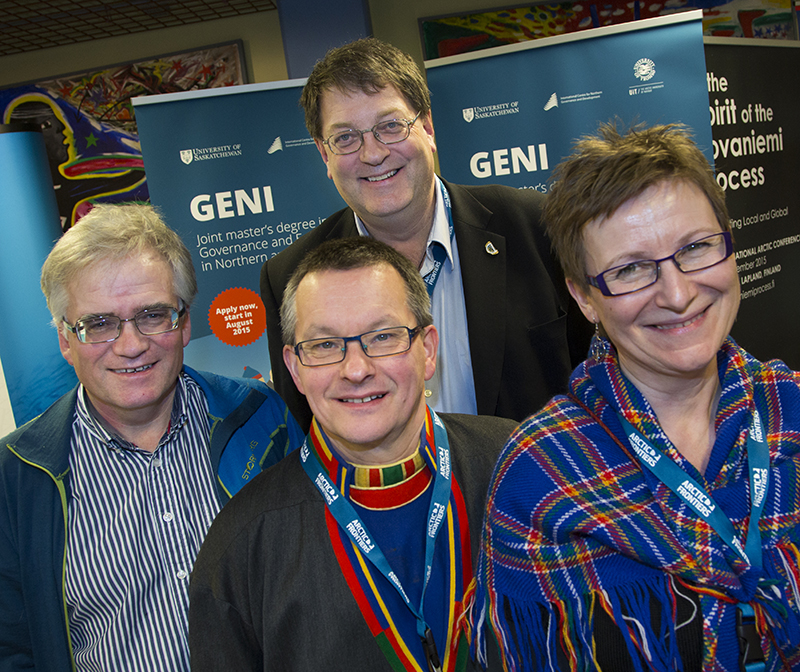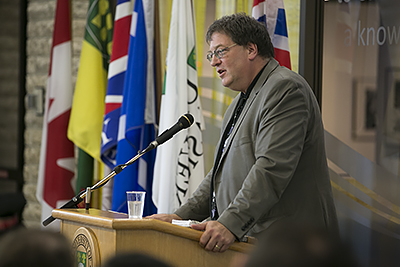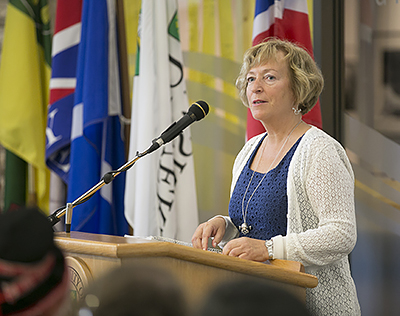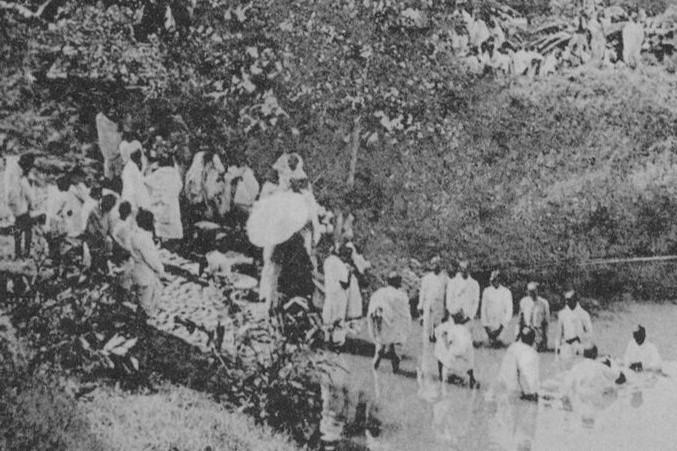– Cameco støtter ikke urfolksmaster
 |
| Professor Hans-Kristian Hernes, UiT, Sven-Roald Nystø, Árran lulesamsisk senter, professor Ken Coates, U of S, og senterleder ved Sesam, UiT, Else Grete Broderstad har stor tro på det første felles masterprogrammet mellom et norsk og et kanadisk universitet. Foto: Stig Brøndbo |
Fredag 13. november startet det første av en rekke radio-, TV og nettoppslag hvor NRK Sápmi omtaler at studenter ved UiT Norges arktiske universitet deltar på en urfolksmaster som er støttet av en omstridt gruvegigant.
– Dette stemmer ikke, og vi har sendt en redegjørelse for finansieringen av masterprogrammet til NRK. Hadde vi fått slippe til med fakta om finansieringen tidligere, kunne mange misforståelser vært unngått. Cameco finansierer ikke dette studiet, skriver professor Ken Coates ved University of Saskatchewan i en mail til NRK (hele redegjørelsen ligger til slutt i denne saken).
 |
| – Cameco finansierer ikke dette studiet, sier professor Ken Coates ved University of Saskatchewan. |
Frivillig
I sin redegjørelse til NRK Sapmi, skriver professor Coates at det kanadiske gruveselskapet bidrar med cirka ti prosent av det årlige budsjettet til universitetet. Han skriver videre at urfolksmasteren GENI, den første fellesmasteren mellom et norsk og et kanadisk universitet, ikke er finansiert av Cameco.
– Våre urfolksstudenter kan søke om stipend fra Cameco, noe også deltakerne på GENI-masteren har gjort. Det er selvsagt helt frivillig å søke om stipend, sier Ken Coates. På Usask sine nettsider har det helt fra studiestarten i september stått at kanadiske urfolksstudenter som selv ønsker det kan søke om å få et studiestipend fra selskapet.
Norsk finansiering
UiT sitt bidrag til masteren og UiT-studentenes deltakelse i masterprogrammet er i sin helhet finansiert via norske, statlige midler, inkludert studentstipend fra Senter for internasjonalisering av utdanning (SIU). Det er ingen økonomiske bindinger mellom UiTs studenter og Cameco. UiT har ingen avtale med Cameco og mottar ingen økonomiske bidra fra dem.
Beklager
Tirsdag sluttet to av masterstudentene på studiet etter at saken om finansieringen av urfolksmasteren fikk mye oppmerksomhet, skriver NRK på sine nettsider.
– Vi beklager at to av våre studenter har sluttet på studiet og at det samiske samfunnet ikke i samme omfang vil få ta del i den kunnskapen og utveksling mellom urfolk som denne fellesmasteren gir, sier Sonni Olsen, dekan ved Fakultetet for humaniora, samfunnsvitenskap og lærerutdanning.
 |
| Dekan Sonni Olsen var i Canada da GENI-masteren ble startet. Hun beklager nå at to UiT-studenter har sluttet. |
Les mer:
GENI-program skal skape nye jobber i nord
GENI: Første fellesmaster med kanadisk universitet
Her er mailen fra University of Saskatchewan til NRK Sapmi:
Thank you for writing to me. I was a bit surprised that you did not contact us before the first item was produced, as it would have avoided some unnecessary misunderstanding.
We do not circulate our budgets outside the university for the obvious and standard reasons that they include personal salary information. Our funding at the Centre comes from multiple sources, including:
- a direct contribution from the Government of Saskatchewan (which covers most of the program delivery and curriculum developments costs for the MNGD and GENI programs),
- funding from the University of Saskatchewan (which covers additional program costs, include online course development),
- money from research grants from academic funding agencies and foundations tied to specific research and outreach initiatives), and
- contributions from donors (such as the one from Cameco, which is the only external donation we have at present, although we have had additional support from external organizations, including Aboriginal agencies).
Your questions are specific to the GENI program and I am pleased to answer that aspect of the inquiry.
As I think you know, Cameco is a Saskatchewan-based company that has substantial and long-term committments to the people and communities of northern Saskatchewan. While they are aware of our relationship with the UiT, their financial contributions are focused on students from northern Canada. Perhaps it is unnecessary to add that our colleagues of the UiT have never once sought any financial support from Cameo as their participation is funded through institutional and Government of Norway resources. Just for your general information, Cameco's contribution amounts to less than 10% of our annual budget.
ICNGD has a five year funding agreement with Cameco that provides $775,000 in support. As it relates to the graduate student support, please note the following elements:
- A per student contribution (for a maximum of 12 students per year) which we match with contributions from the Government of Canada through the Mitacs program. This allows us to pay substantial stipents for all Canadian MNGD and GENI students, which they use to cover tuition and other costs. I should note that the Mitacs program, which is a popular and successful Canada-wide initiative, requires external and typically private sector contributions to match the Government's support. Without the Cameco contribution, we would lose both the Cameco and the MItacs components of the student funding. We know that the vast majority of the students would not, in such circumstances, be able to participate in graduate studies at the University of Saskatchewan. ICNGD's Mitacs program is the largest Aboriginal-focused initiative in the country.
- A per student contribution (for a maximum of 12 students per year) which covers the students' costs of participating in a northern Scandinavia field school. The field school allows the students to visit communities in northern Norway, to meet with Sami and regional officials and to examine economic development activities in the region. This experience has been a highlight of the graduate programs for participants; for virtually every student, the field school is their first experience in northrn Scandianavia and with the Sami.
Cameco also provides in-kind contributions to provide MNGD, GENI and selected University of Saskatchewan students and faculty (but not the students from the GENI program at UiT) with a trip to an operating Cameco mine in northern Saskatchewan.
You could speak to me or the Executive Director of ICNGD, Dr. Greg Poelzer, tomorrow if you wish to discuss this further with us. Greg was the Founding DIrector of ICNGD and has a longer background with the Centre.
Yours truly
Ken Coates,
Canada Research Chair in Regional Innovation
Johnson-Shoyama Graduate School of Public Policy
Director
International Centre for Northern Governance and Development
Ønsket strategi
Samarbeidet med USask om GENI-programmet er et svar på Kunnskapsdepartementets uttalte strategi om økt internasjonalt samarbeid innenfor høyere utdanning. Masterprogrammet er unikt av flere grunner. All undervisning er direkte relevant for urfolkssamfunn og lokalsamfunn. Tross store forskjeller mellom Nord-Norge og vår skandinaviske verden og kanadiske forhold, er det mye vi kan lære av hverandre. En sentralt tema i programmet er hvordan urfolk og lokalsamfunn på en best mulig måte selv kan legge premisser for den utviklinga vi ser spiller seg ut i nordområdene. Det er denne kompetansen vi ønsker å bygge hos våre GENI-studenter på begge sider av Atlanteren, slik at de kan håndtere de utfordringer og muligheter som oppstår i skjæringspunktet mellom myndigheter, lokalsamfunn og næringsutvikling.


